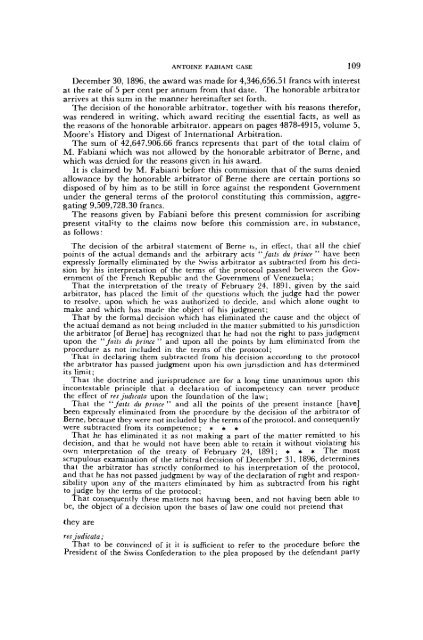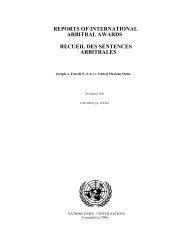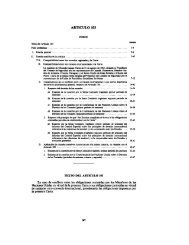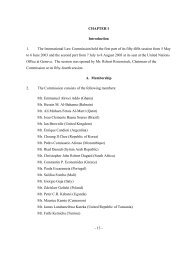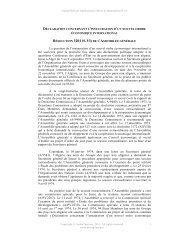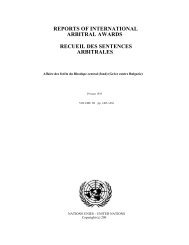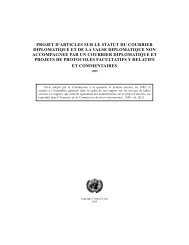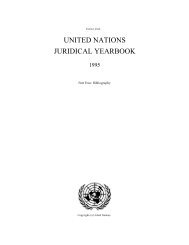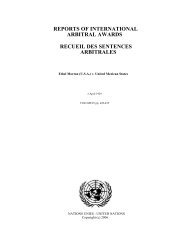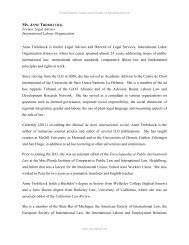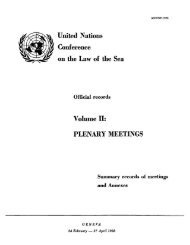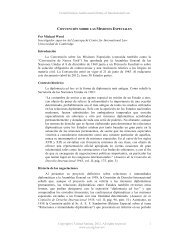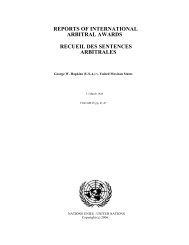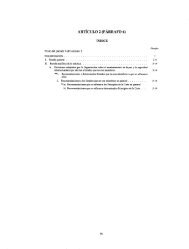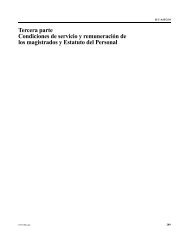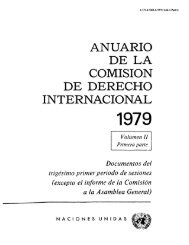Antoine Fabiani Case - United Nations Treaty Collection
Antoine Fabiani Case - United Nations Treaty Collection
Antoine Fabiani Case - United Nations Treaty Collection
Create successful ePaper yourself
Turn your PDF publications into a flip-book with our unique Google optimized e-Paper software.
ANTOINE FABIANI CASE 109<br />
December 30, 1896, the award was made for 4,346,656.51 francs with interest<br />
at the rate of 5 per cent per annum from that date. The honorable arbitrator<br />
arrives at this sum in the manner hereinafter set forth.<br />
The decision of the honorable arbitrator, together with his reasons therefor,<br />
was rendered in writing, which award reciting the essential facts, as well as<br />
the reasons of the honorable arbitrator, appears on pages 4878-4915, volume 5,<br />
Moore's History and Digest of International Arbitration.<br />
The sum of 42,647,906.66 francs represents that part of the total claim of<br />
M. <strong>Fabiani</strong> which was not allowed by the honorable arbitrator of Berne, and<br />
which was denied for the reasons given in his award.<br />
It is claimed by M. <strong>Fabiani</strong> before this commission that of the sums denied<br />
allowance by the honorable arbitrator of Berne there are certain portions so<br />
disposed of by him as to be still in force against the respondent Government<br />
under the general terms of the protocol constituting this commission, aggregating<br />
9,509,728.30 francs.<br />
The reasons given by <strong>Fabiani</strong> before this present commission for ascribing<br />
present vitality to the claims now before this commission are, in substance,<br />
as follows:<br />
The decision of the arbitral statement of Berne is, in effect, that all the chief<br />
points of the actual demands and the arbitrary acts " jails du prince " have been<br />
expressly formally eliminated by the Swiss arbitrator as subtracted from his decision<br />
by his interpretation of the terms of the protocol passed between the Government<br />
of the French Republic and the Government of Venezuela;<br />
That the interpretation of the treaty of February 24, 1891, given by the said<br />
arbitrator, has placed the limit of the questions which the judge had the power<br />
to resolve, upon which he was authorized to decide, and which alone ought to<br />
make and which has made the object of his judgment;<br />
That by the formal decision which has eliminated the cause and the object of<br />
the actual demand as not being included in the matter submitted to his jurisdiction<br />
the arbitrator [of Berne] has recognized that he had not the right to pass judgment<br />
upon the "jails du prince " and upon all the points by him eliminated from the<br />
procedure as not included in the terms of the protocol;<br />
That in declaring them subtracted from his decision according to the protocol<br />
the arbitrator has passed judgment upon his own jurisdiction and has determined<br />
its limit;<br />
That the doctrine and jurisprudence are for a long time unanimous upon this<br />
incontestable principle that a declaration of incompetency can never produce<br />
the effect of res judicata upon the foundation of the law;<br />
That the " jails du prince " and all the points of the present instance [have]<br />
been expressly eliminated from the procedure by the decision of the arbitrator of<br />
Berne, because they were not included by the terms of the protocol, and consequently<br />
were subtracted from its competence; * * *<br />
That he has eliminated it as not making a part of the matter remitted to his<br />
decision, and that be would not have been able to retain it without violating his<br />
own interpretation of the treaty of February 24, 1891; * * * The most<br />
scrupulous examination of the arbitral decision of December 31, 1896, determines<br />
that the arbitrator has strictly conformed to his interpretation of the protocol,<br />
and that he has not passed judgment by way of the declaration of right and responsibility<br />
upon any of the matters eliminated by him as subtracted from his right<br />
to judge by the terms of the protocol;<br />
That consequently these matters not having been, and not having been able to<br />
be, the object of a decision upon the bases of law one could not pretend that<br />
they are<br />
res judicata ;<br />
That to be convinced of it it is sufficient to refer to the procedure before the<br />
President of the Swiss Confederation to the plea proposed by the defendant party


